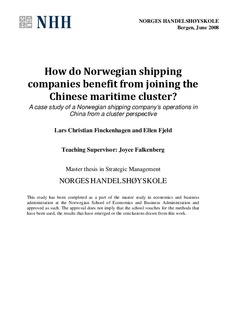How do Norwegian shipping companies benefit from joining the Chinese maritime cluster? : a case study of a Norwegian shipping company’s operations in China from a cluster perspective
Master thesis
Permanent lenke
http://hdl.handle.net/11250/168151Utgivelsesdato
2008Metadata
Vis full innførselSamlinger
- Master Thesis [4372]
Sammendrag
Norwegian shipping occupies considerable market shares internationally and has achieved
dominating positions within many segments. Thus, Norway appears as one of the leading
maritime nations with one of the most complete maritime clusters in the world, a position that
has been maintained since the beginning of the 1900’s.
During the last three decades, China has experienced an extraordinary growth within some of
the maritime industries as the Chinese market has opened up. Foreign investors, among them
Norwegian shipping companies, are attracted by this growth and have recently carried out
large-scaled investments in new and strategically located ports. This thesis explores one of
them as a case company with the objective to find out how Norwegian shipping companies in
general are able to benefit from joining the Chinese maritime cluster.
The thesis is based on the framework of Michael Porter’s Competitive Advantage of Nations:
the Diamond (1990). It explores by using this model whether the Chinese diamond generates
cluster effects in terms of upgrading mechanisms and whether these in turn can lead to
benefits that are achievable for Norwegian shipping companies operating there. The thesis
extends Porter’s theory by investigating whether companies from foreign nations can utilise
cluster benefits in a host country.
The research strategy used is single case study. The analysis is carried out by collecting
primary data from interviews with respondents both internal and external to the case company
and then matching this with relevant secondary data. Findings from the analysis show that
there as of today exists no complete Chinese maritime cluster and that Norwegian shipping
companies thus are still unable to benefit from cluster effects in terms of upgrading
mechanisms in China. Maritime China as of today consists mainly of shipbuilding and
shipping companies and is too incomplete to be labelled a cluster. The findings however point
towards the existence of a Chinese maritime cluster and upgrading mechanisms in a distant
future.
